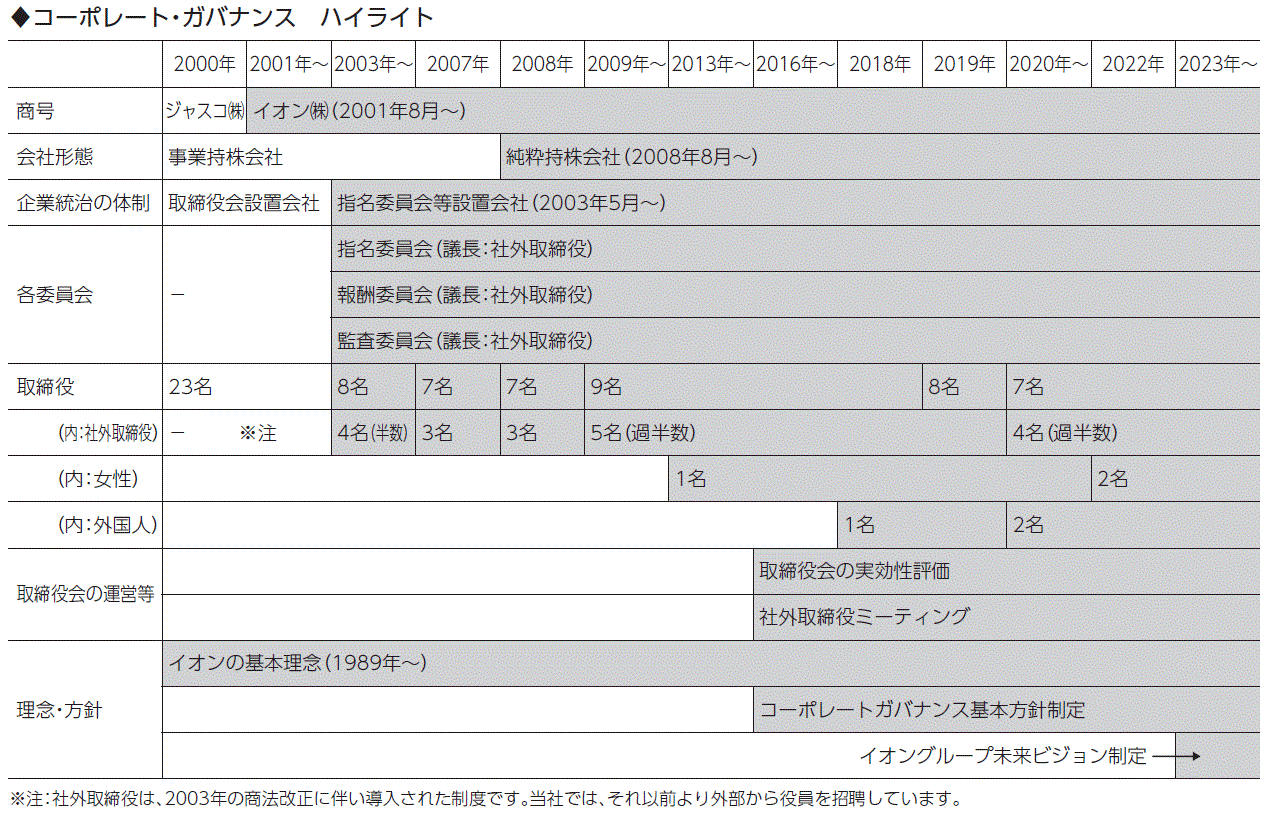当社株式の大量取得行為に関わる対応方針
当社株式は、金融商品取引所(証券取引所)に上場され自由な売買が可能ですが、万一短期的な利益を追求するグループ等による買収が開始されて不公正な買収提案がなされると、株主の皆さまに結果として不利益を与えるおそれもあります。買収提案を受け入れるか否かは株主の皆さまの判断によるべきものですが、買収提案のあった際に、株主の皆さまが、十分かつ正確な情報と十分な時間のもとにご判断いただけるように十分な資料提供をするように所定の手順をふむことを求めるとともに、明らかに株主一般の利益を害すると判断される買収行為には対策を講じることができるように、「当社株式の大量取得行為に関わる対応方針承認の件」を2024年5月29日開催の第99期定時株主総会に付議し、株主の皆さまのご承認をいただきました。
本件方針は、特定株主グループ*1の議決権割合*2を20%以上とすることを目的とする当社株式等*3の買付行為、または結果として特定株主グループの議決権割合が20%以上となる当社株式等の買付行為(以下、このような買付行為を「大量株式取得」といい、大量株式取得を行いまたは行おうとする者を「大量株式取得者」といいます。)に関する対応方針であります。大量株式取得行為に関わる提案があった際に、株主の皆さまが、十分かつ正確な情報と十分な時間のもとにご判断いただけるよう、本件方針を定めています。
なお、本件方針の内容は下記のとおりであります。
1. 会社の支配に関する基本方針
2. 本件ルールの内容
3. 大量株式取得が行われた場合の対応方針
4. 株主・投資家に与える影響等
本件ルールは、当社株主の皆さまが大量株式取得に応じるか否かを判断するために必要な情報や、当社取締役会の意見を当社株主の皆さまに開示し、さらには、当社株主の皆さまが代替案の提示を受ける機会を確保することを目的としています。これにより、当社株主の皆さまは、適切な情報のもとで大量株式取得に応じるか否かについての適切な判断をすることが可能となります。
大量株式取得者が本件ルールを遵守しなかった場合やその提案について株主共同の利益が害されるおそれが大きいと判断される場合には、当社取締役会は、当社および当社株主全体の利益を守ることを目的として、会社法その他の法律および当社定款により認められる対抗措置をとることがあります。この場合には、法令および規則に従って適時適切な開示を行います。
なお、対抗措置として発行される取得条項付新株予約権については、大量株式取得者だけが行使を制限される行使条件差別型を原則として想定しており、これ以外の対抗措置を採用する場合にも、大量株式取得者以外の株主・投資家に不測の損害を与えないものを選択します。
5. 本件方針の適用開始と有効期限
本件ルールを含む本件方針は、本定時株主総会における本件方針の承認を求める議案の決議時点で適用が開始されます。定期的に対応方針の見直しをするために、本件方針の有効期間を3年間(本年3月1日から起算して3年以内に終了する事業年度のうち最終のものに係る定時株主総会の終結時まで)としています。
今後につきましては、法令改正等を踏まえ、当社取締役会が、本件方針の形式的な変更または廃止が相当と判断する場合には、速やかにお知らせします。なお、本件方針の廃止について特段の制約は設けていません。当社取締役会が、本件方針の内容について当社株主の皆さまに実質的に影響を与えるような変更を行う場合には、改めて当社株主総会に付議し株主の皆さまのご判断を仰ぐこととします。
- *1.特定株主グループとは、
- 当社の株式等(金融商品取引法第27条の23第1項に規定する株券等をいいます。)の保有者(同法第27条の23第3項に基づき保有者に含まれる者を含みます。以下同じとします。)およびその共同保有者(同法第27条の23第5項に規定する共同保有者をいい、同条第6項に基づき共同保有者とみなされる者を含みます。以下同じとします。)または、
- 当社の株式等(同法第27条の2第1項に規定する株券等をいいます。)の買付け等(同法第27条の2第1項に規定する買付け等をいい、取引所金融商品市場において行われるものを含みます。)を行う者およびその特別関係者(同法第27条の2第7項に規定する特別関係者をいいます。)を意味します。
- *2.:議決権割合とは、
- 特定株主グループが、*1の1.記載の場合は、当該保有者の株式等保有割合(金融商品取引法第27条の23第4項に規定する株券等保有割合をいいます。この場合においては、当該保有者の共同保有者の保有株式等の数(同項に規定する保有株券等の数をいいます。)も加算するものとします。)または、
- 特定株主グループが、*1の2.記載の場合は、当該大量株式取得者および当該特別関係者の株式等保有割合(同法第27条の2第8項に規定する株券等所有割合をいいます。)の合計をいいます。
各株式等保有割合の算出に当たっては、総議決権(同法第27条の2第8項に規定するものをいいます。)および発行済株式の総数(同法第27条の23第4項に規定するものをいいます。)は、有価証券報告書、半期報告書、四半期報告書および自己株券買付状況報告書のうち直近に提出されたものを参照することができるものとします。
- *3.金融商品取引法第27条の23第1項に規定する株券等を意味します。以下同じとします。
- *4.当社は日本の金融商品取引市場に株式を上場しており、日本人である株主・投資家に適時開示をする義務を負っていますので、当社が交付するリスト、大量株式取得者が作成する本必要情報を記載した書面、当社のこれに対する意見・追加資料提出要請等のいずれについても、日本語の書面によるものを正式とします。書面とは、紙に印刷された文書だけでなく、電子メールもしくはファクシミリにより送信された文書を含むものとします。書面は、A4サイズまたはA3サイズとし、これらのサイズに印刷された文字の大きさが10ポイント(JIS Z 8305によります。)以上であることを要するものとします。書面は、作成名義人が自ら日本語で作成するものとし、また、当社はいずれの書面についてもこれを外国語に翻訳する義務を負わないものとします。また、受信した当社において、ファクシミリ用紙からのはみ出しや当社のシステムに登録されていない文字・記号が用いられているなどの合理的な理由に基づき紙に印刷されない文字や記号は、記載されていないものとみなします。以下同じとします。
- *5.ここに記載された日本国内連絡先を、当社の本件ルールに基づく書面送付先・連絡先とします。
- *6.大量株式取得者が、(1)真に会社経営に参加する意思がないにもかかわらず、ただ株価をつり上げて高値で株式を会社関係者に引き取らせる目的で当社株式の買収を行っている場合、(2)会社経営を一時的に支配して当社の事業経営上必要な知的財産権、ノウハウ、企業秘密情報、主要取引先や顧客等を当該大量株式取得者等に移譲させるなど、いわゆる焦土化経営を行う目的で当社株式の買収を行っている場合、(3)会社経営を支配した後に、当社の資産を当該大量株式取得者等の債務の担保や弁済原資として流用する予定で当社株式の買収を行っている場合、(4)会社経営を一時的に支配して当社の事業に当面関係していない不動産、有価証券など高額資産等を売却等処分させ、その処分利益をもって一時的な高配当をさせるかあるいは一時的高配当による株価の急上昇の機会を狙って株式の高価売り抜けをする目的で当社株式の買収を行っている場合、(5)大量株式取得者の提示する当社株式買取方法が、2段階目の株式買取条件を1段階目よりも不利に設定する態様の2段階買取方式である場合、その他、株主の判断の機会または自由を制約し、事実上、株主に当社株式等の不利な売却を強要するおそれがあると判断される場合、(6)大量株式取得者の提示する対価が株主にとって著しく不利益またはハイリスクとなりうるオプション権であるなど、当社株式買付に関連する取引の仕組み、取得方法が株主共同の利益の観点から著しく不当である場合、(7)大量株式取得者の経営陣または主要株主に「暴力団員による不当な行為の防止等に関する法律」第2条の定める暴力団、暴力団員等の反社会的勢力と関係を有する者が含まれている場合等、大量株式取得者が公序良俗の観点から当社の支配株主として不適切であると客観的かつ合理的な根拠をもって判断される場合を想定しています。


